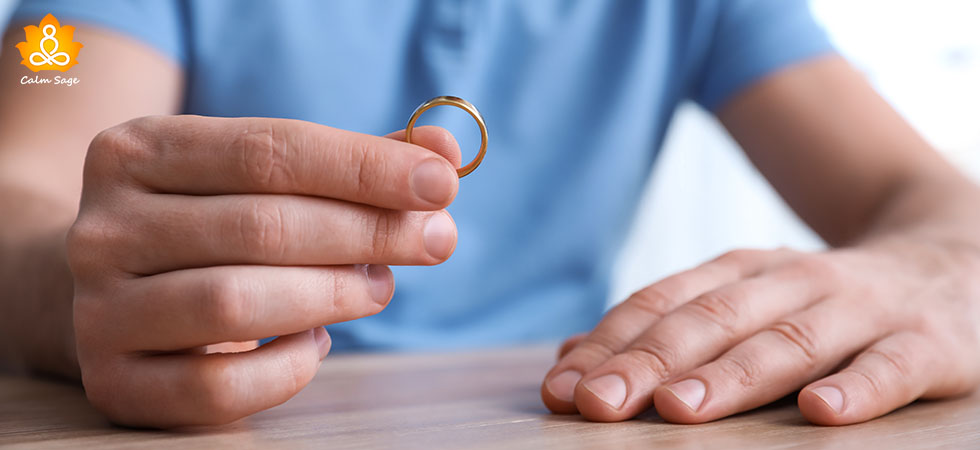How Men’s Mental Health Is Impacted After Divorce?

When marriage is considered as an equal companionship, why divorce is considered one-sided? Why do women get all the focus and men do not even get the empathy? Well, the fact is “divorce is quite unpredictable.”
Not being gender-specific here, but it can despair some people, meanwhile, it can feel liberated for some. Some people start seeing other people right away; meanwhile, some spend their whole life missing their old ones.
Whatever be the situation, men’s mental health is actually impacted during the separation process and after divorce. No wonder, we always neglect the mental health of men after divorce due to some stereotypical thinking. Breaking all the stereotypes here, let’s discuss men’s mental health after divorce. So, let’s get started.
Content warning: Please be advised, the article mentions topics that contain abuse and substance overuse. The information found in the article is not a substitute for professional medical advice. Always seek the advice of mental health professionals before concluding anything on your own.
Life After Divorce: Impact on Men’s Mental Health

Divorce is painful and stressful for both (men and women). We often ignore the feelings of men because we believe that men can actually face heavy burdens or they can’t feel anything at all. If you also think like this, you might be wrong here, because according to a survey, men’s mental and physical health is also devastated after a divorce.
According to a survey published by “Journal of Men’s Health”, unmarried and divorced men have a higher probability of experiencing depression and substance use than married men. The real fact is that there are 250% higher chances of the mortality rate of divorced men over married men.
Not only this, but they are also prone to hypertension, cardiovascular disease, stroke, and other health issues. Additionally, they are also risky towards activities like alcohol and drug use.
The difference between Men’s and Women’s Mental Health after Divorce

As I said, divorce is painful and stressful for both, so how can we conclude that women feel more grief than men?
Divorce means losing your social support, your partner, and your everything which means there is a high risk of isolation for both parties involved. According to research, around 82% of men have a high risk of dying from heart disease after divorce. The fact is that men and women need support and encouragement after divorce.
However, the real truth is that men are less probable towards getting help than women. With proper guidance and support, men can also overcome such hard times.
Men’s Life after Divorce: Stages of Grief
There are stages related to grief after divorce but they won’t come in order. Below are some stages of grief to prepare yourself after divorce.
1. Shock and Denial
The first-ever stage of grief is shock and denial which comes during the separation process. You may start feeling numb and may deny the fact that you two are actually parting your ways.
2. Pain and Guilt
After the shock and denial, you may feel pain and guilt during and after the separation process. This stage can be really heart-breaking as you’re likely to face your emotions here. Just make sure that you’re not using alcohol or drugs as a coping mechanism. Relying on these will worsen things even more. At this stage, you must seek proper guidance.
If you’re not able to cope with your feelings and emotions during or after divorce, consider connecting with a mental health professional.
Connect with a Mental Health Professional
3. Depression, Reflection, Isolation
After pain and guilt, you may start feeling depressed or may isolate yourself from everyone. At this stage, you’re likely to hit reality. Therefore, avoid using any substance; instead, learn how to cope with such feelings.
4. Anger
Along with the depressive feelings and isolation, you may also start becoming angry or may start bargaining with your partner to resolve the situation. Please make sure you don’t create any scene out of anger, if there is a chance of still resolving things, communicate your feelings nicely and gently.
5. The major turn
After these four stages, you may start to turn around the situation. At this point, you may start to cope with your feelings in a better way. You will eventually feel the pain, but there will be some good days as well.
6. Reconstruction
The reconstruction stage is the most empowering stage. In this stage, you begin to “move on.”
7. Acceptance
This is the final stage wherein you begin to accept the situations and pull out the negatives from your life. At this stage, you finally start to take important steps for your future.
Building a Better Life after Divorce

Here are some coping strategies and tips to build a better life after divorce:
- Take your time to grief and bounce back stronger.
- Join a support group or take the support from your family or friends.
- Focus on your physical and mental health.
- Take responsibility for your actions and decisions and set goals for your future.
- Plan your finances according to the laws.
- Set goals for your future and take a small break (if you want).
- Seek help when required.
Divorce is a painful process; therefore, don’t hesitate in asking for help or support. Remember, you can always connect with a counselor for help and plan your future positively.
To connect with a mental health professional from BetterHelp, click here.
I hope this blog helps you to understand “how men’s mental health is impacted after divorce.” Comment down and share your views on the same. For more such content, connect with us on all social media platforms.
Thanks for reading.
More power to you!




















